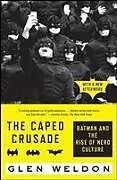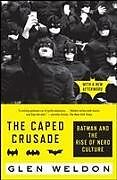The Caped Crusade
Einband:
Kartonierter Einband
EAN:
9781476756738
Untertitel:
Batman and the Rise of Nerd Culture
Genre:
Geschichte
Autor:
Glen Weldon
Herausgeber:
Simon & Schuster
Anzahl Seiten:
360
Erscheinungsdatum:
21.03.2017
ISBN:
978-1-4767-5673-8
Zusatztext " The Caped Crusade is seriously informed! daringly opinionated and endlessly charming...It's not just a book about Batman! its Nerd Culture's origin story." Guy Branum! host of Pop Rocket Informationen zum Autor Glen Weldon has been a theater critic! a science writer! an oral historian! a writing teacher! a bookstore clerk! a movie usher! a PR flack! an inept marine biologist! and a slightly-better-than-ept competitive swimmer. His work has appeared in The New York Times ! The Washington Post ! The New Republic ! Slate ! The Atlantic ! The Village Voice ! The Philadelphia Inquirer ! and many other places. He is a panelist on NPR's Pop Culture Happy Hour and reviews books and comic books for NPR.org. The author of Superman: The Unauthorized Biography and The Caped Crusade: Batman and the Rise of Nerd Culture ! he lives in Washington! DC. Klappentext A witty! intelligent cultural history from Glen Weldon that explains Batman's rises and falls throughout the ages-and what his story tells us about ourselves. Zusammenfassung A witty, intelligent cultural history from Glen Weldon that explains Batman's rises and falls throughout the ages-and what his story tells us about ourselves.
"The Caped Crusade is seriously informed, daringly opinionated and endlessly charming...It’s not just a book about Batman, its Nerd Culture’s origin story." —Guy Branum, host of Pop Rocket
Autorentext
Glen Weldon has been a theater critic, a science writer, an oral historian, a writing teacher, a bookstore clerk, a movie usher, a PR flack, an inept marine biologist, and a slightly-better-than-ept competitive swimmer. His work has appeared in The New York Times, The Washington Post, The New Republic, Slate, The Atlantic, The Village Voice, The Philadelphia Inquirer, and many other places. He is a panelist on NPR’s Pop Culture Happy Hour and reviews books and comic books for NPR.org. The author of Superman: The Unauthorized Biography and The Caped Crusade: Batman and the Rise of Nerd Culture, he lives in Washington, DC.
Klappentext
A witty, intelligent cultural history from Glen Weldon that explains Batman’s rises and falls throughout the ages—and what his story tells us about ourselves.
Zusammenfassung
The Caped Crusade is a fascinating, critically acclaimed chronicle of the rises and falls of one of the world’s most iconic superheroes and the fans who love him—now with a new afterword.
For nearly a century, Batman has cycled through eras of dark melodrama and light comedy and back again. How we perceive his character, whether he’s delivering dire threats in a raspy Christian Bale growl or trading blithely homoerotic double entendres with Robin the Boy Wonder, speaks to who we are and how we wish to be seen by the world. It’s this endless adaptability that has made him so lasting, and ultimately human.
But it’s also Batman’s fundamental nerdiness that uniquely resonates with his fans and makes them fiercely protective of him. As Weldon charts the evolution of Gotham’s Guardian from Bob Kane and Bill Finger’s hyphenated hero to Christopher Nolan’s post-9/11 Dark Knight, he reveals how this symbol of justice has made us who we are today and why his legacy remains so strong. Well-researched, insightful, and engaging, The Caped Crusade, with a new afterword by the author, has something for everyone.
Leseprobe
The Caped Crusade INTRODUCTION Batman, Nerd
Over his seven decades of fictive life, the elastic concept of “Batman” has taken on a host of shapes. He started off simply enough, as a murderous, gun-wielding rip-off of the Shadow. Since then he’s clocked field time as a time-and-space-hopping gadabout, a Pop Art scoutmaster, a globe-trotting master spy, a gadget-happy criminologist, and a grim, remorseless ninja of the urban night.
No single image defines Batman, because any single image is too small to contain the various layered and at times contradictory meanings we’ve instilled in him. Since his first appearance, we have projected onto the character our own fears, our preoccupations, our moral imperatives, and have seen in him what we wish to.
It’s this limitless capacity for interpretation that sets him apart from his comparatively stolid fellows in spandex. It’s why so many different iterations of Batman have managed to escape the nerd enclave of comics to blithely coexist in the cultural consciousness of normals. Anyone can look at Christian Bale’s Kevlar-suited, mouth-breathing Batman, croaking his dire threats like an enraged, laryngitic frog, and immediately recognize him as the same character as Adam West’s Batusi Batman, out there on the go-go floor, shaking what his dead mama gave him.
They are both equally true, because every thirty years or so Batman cycles from dark to light and back again. Twice before in his seventy-seven-year history, the Dark Knight has given way to the Camp Crusader, and twice before a small subset of his most ardent fans have risen up in protest to demand that Batman return to his grittier roots. These hard-core enthusiasts accept only the darkest, grimmest, most hypermasculine version of the character imaginable and view any alternate Bat-iteration as somehow suspect, inauthentic, debased, and ssssorta gay.
Adam West’s Batman ended one cycle in 1969, and Denny O’Neil and Neal Adams’s Batman began the next the following year. Joel Schumacher’s Batman ended that second cycle in the mid-nineties; ten years later, Christopher Nolan’s Batman began the one in which we now find ourselves.
But this recursive pattern isn’t immediately apparent to the casual fan. To the culture at large, it’s the mix that matters.
To most people, there is no one Batman, but an endless blurry parade of Batmen, broadly identifiable by a series of core signifiers: millionaire Bruce Wayne, dead parents, bat costume, secret lair, and Gotham City. Precisely how these signifiers combine, and in what idiom—crime noir, gothic melodrama, Boy’s Own adventure, spy thriller, broad slapstick, or slick science fiction—remains endlessly, defiantly mutable. It’s exactly this protean adaptability (paired with a multinational megaconglomerate’s marketing muscle) that has ensured the character’s longevity.
That, and his vaunted “relatability.”
THE MYTH OF RELATABILITY
“Batman’s my guy,” a friend and lifelong comics fan told me when I described this book project to him. “No powers, just grit. He’s human. He’s relatable.”
This is an oft-heard refrain among the subset of people who talk and think about superheroes. We were sitting in a diner; our order had just arrived. “You or I,” he said, pointing with his French fry at each of us in turn, before dipping it into his milkshake, “could be Batman.”
Here’s the thing: we really could not.
But we think we could.
There is a widespread tendency, among nerds and normals alike, to dismiss the impact of Bruce Wayne’s billionaire status on the idea of Batman. But of course that wealth is Batman’s true superpower. Its narrative function, in any Batman story, is to turn the flatly impossible into the vaguely plausible. It works, essentially, as magic.
Yet few fans acknowledge t…

Leider konnten wir für diesen Artikel keine Preise ermitteln ...
billigbuch.ch sucht jetzt für Sie die besten Angebote ...
Die aktuellen Verkaufspreise von 6 Onlineshops werden in Realtime abgefragt.
Sie können das gewünschte Produkt anschliessend direkt beim Anbieter Ihrer Wahl bestellen.
Loading...
Die aktuellen Verkaufspreise von 6 Onlineshops werden in Realtime abgefragt.
Sie können das gewünschte Produkt anschliessend direkt beim Anbieter Ihrer Wahl bestellen.
| # | Onlineshop | Preis CHF | Versand CHF | Total CHF | ||
|---|---|---|---|---|---|---|
| 1 | Seller | 0.00 | 0.00 | 0.00 |
